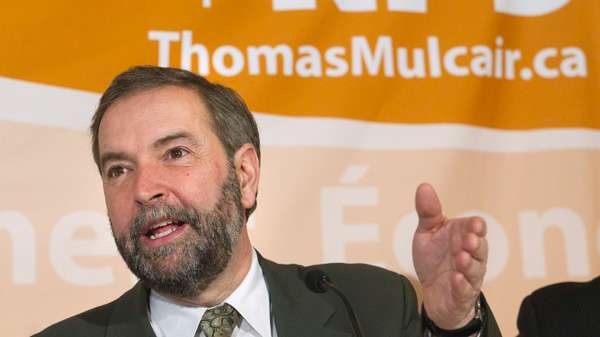New Democratic Party (NDP) Leader Thomas Mulcair tackled issues facing the younger generation and the country during an event hosted by NDP McGill on Feb. 14.
Mulcair, who received his law degree from McGill in 1977, expressed enthusiasm for returning to his alma mater.
“I’m thrilled to be back here at McGill and in this room—I know how hokey it sounds, but it’s true,” he said. “My studies at McGill started in this room, just over 40 years ago.”
For the younger generation, Mulcair said education can pose unprecedented financial difficulties—in particular, rising tuition costs for university students.
“Twenty-five years ago, 82 per cent of the budget of Canada’s universities and colleges was provided by the government,” he said. “Today, it’s not rare to see students borrowing $50,000 to finish their degree.”
Although Mulcair did not give any specific policy measures, he said he would work to increase federal funding to post-secondary education.
According to Mulcair, problems with education are also prevalent in Canada’s Indigenous communities. While he denounced the Aboriginal residential school system of the past and the abhorrent conditions many Indigenous children experienced there, Mulcair also condemned the state of reservations today.
“First Nations kids receive 35 per cent less funding for per capita than other Canadian kids,” he said. “Conditions on reserves are perpetuating things like tuberculosis that should be diseases of the past [….] Those are problems that are easy to identify and they are also easy to fix if you make them a priority. Governing is about making priorities.”
Mulcair also spoke out against Prime Minister Stephen Harper’s health care plans, specifically criticizing his planned cuts of up to $36 billion in health care funding.
“The NDP introduced free universal health care in Canada, and that’s now generalized across the country,” he said. “We should fight to maintain it.”
He encouraged younger voters to more actively participate in the political sphere and emphasized the danger of not voting.
“What has been there in the past for your parents is now at risk for you,” he said. “Yet, 65 per cent percent of young people aged 18 to 25 didn’t vote in the last election.”
Attended by approximately 60 members of the McGill community, the event gave members of the McGill community the opportunity to ask Mulcair questions. When asked about potential Senate reform, he proposed the idea of elimination of the Senate as a whole.
“The abolition of the Senate is the simplest solution,” he said. “Unicameral parliament—the same thing in all of the Scandinavian countries—works.”
One U2 political science student, who asked to remain anonymous, disagreed with Mulcair about the Senate.
“Not even trying to reform a house that has accomplished numerous important tasks in Canadian politics is a disservice,” the student said. “Simply removing the Senate won’t stop the partisan bickering in parliament, which Mulcair is just as much a part of.”
Caleb Holden, president of the NDP club at McGill, said he was happy with the content of the discussion.
“I’m happy to see how much [Mulcair] touched on Indigenous issues in Canada,” Holden said. “I’m also happy to see him talk about things that are pertinent to students, such as student internships and some do-nothing elements of the budget that came out earlier this week. We need to have more policies geared towards our younger voters.”
Viviane Cheng, U1 Management, said she was surprised at Mulcair’s level of candour.
“After what he said, I’m sort of changing my views [about him],” Cheng said. “I think he is genuine and really does want the best for Canadians.”







